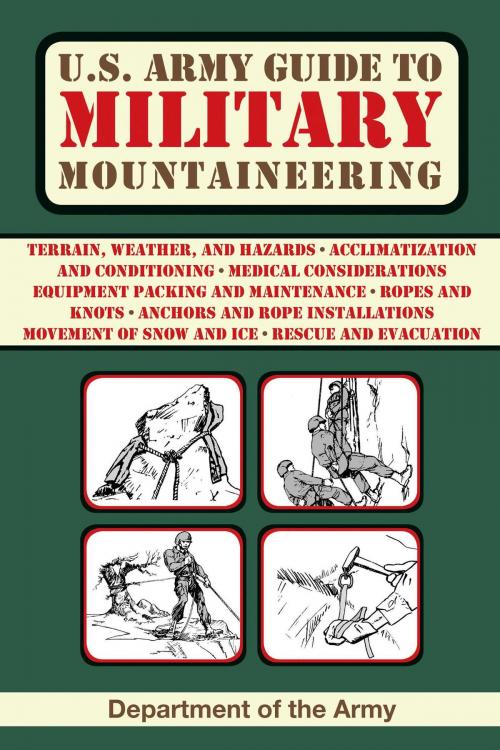U.S. Army Guide to Military Mountaineering
Nonfiction, Sports, Outdoors, Outdoor Skills, Science & Nature, Technology, Military Science, History, Military| Author: | Department of the Army | ISBN: | 9781629140797 |
| Publisher: | Skyhorse | Publication: | June 10, 2014 |
| Imprint: | Skyhorse | Language: | English |
| Author: | Department of the Army |
| ISBN: | 9781629140797 |
| Publisher: | Skyhorse |
| Publication: | June 10, 2014 |
| Imprint: | Skyhorse |
| Language: | English |
Mountains exist in almost every country in the world and almost every war has included some type of mountain operations. This pattern will not change, and soldiers will continue to fight in mountainous terrain in future conflicts. Although mountain operations have not changed, several advancements in equipment and transportation have increased the soldiers’ capabilities. The helicopter now allows access to terrain that was once unreachable or could be reached only by slow methodical climbing. Inclement weather, however, may place various restrictions on the capabilities of air assets available to a commander. The unit must then possess the necessary mountaineering skills to overcome adverse terrain to reach an objective.
The U.S. Army Guide to Military Mountaineering details techniques soldiers and leaders must know to cope with mountainous terrain. These techniques are the foundation upon which the mountaineer must build. They must be applied to the various situations encountered to include river crossings, glaciers, snow-covered mountains, ice climbing, rock climbing, and urban vertical environments. The degree to which this training is applied must be varied to conform to known enemy doctrine, tactics, and actions. This guide also discusses basic and advanced techniques to include acclimatization, illness and injury, equipment, anchors, evacuation, movement on glaciers, and training.
Mountains exist in almost every country in the world and almost every war has included some type of mountain operations. This pattern will not change, and soldiers will continue to fight in mountainous terrain in future conflicts. Although mountain operations have not changed, several advancements in equipment and transportation have increased the soldiers’ capabilities. The helicopter now allows access to terrain that was once unreachable or could be reached only by slow methodical climbing. Inclement weather, however, may place various restrictions on the capabilities of air assets available to a commander. The unit must then possess the necessary mountaineering skills to overcome adverse terrain to reach an objective.
The U.S. Army Guide to Military Mountaineering details techniques soldiers and leaders must know to cope with mountainous terrain. These techniques are the foundation upon which the mountaineer must build. They must be applied to the various situations encountered to include river crossings, glaciers, snow-covered mountains, ice climbing, rock climbing, and urban vertical environments. The degree to which this training is applied must be varied to conform to known enemy doctrine, tactics, and actions. This guide also discusses basic and advanced techniques to include acclimatization, illness and injury, equipment, anchors, evacuation, movement on glaciers, and training.















